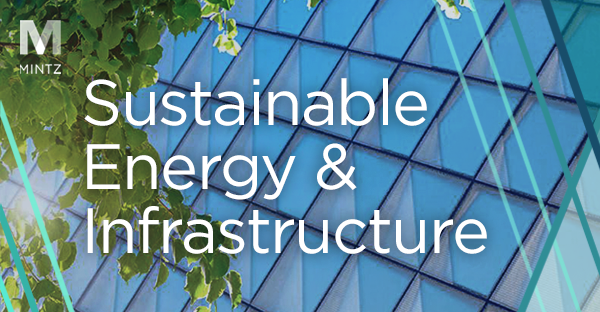Energy & Sustainability Washington Updates - August 2021
Infrastructure Bill Advanced in Senate
After weeks of negotiation between the White House and a bipartisan group of Senators, on July 28 agreement was announced on the bipartisan Infrastructure Investment and Jobs Act, with President Biden saying in a statement that this legislation represents “the most significant long-term investment in our infrastructure and competitiveness in nearly a century.”
Find the bill text by clicking HERE.
The Senate quickly moved to open debate on the $1 trillion agreement with a bipartisan vote of 67-32 and later passed the bill in a vote of 69-30. The agreement includes $550 billion in new spending over five years, in addition to planned spending for items like the five-year surface transportation reauthorization bill which must be passed by September 30.
While the bipartisan compromise measure does not go as far as many progressives had hoped, it does include a number of titles devoted to energy infrastructure, found in the Energy Infrastructure Act approved by the Senate Energy & Natural Resources Committee in July, including:
- Grid Infrastructure and Resiliency
- Supply Chains for Clean Energy Technologies
- Fuels and Technology Infrastructure Investments
- Enabling Energy Infrastructure Investment and Data Collection
- Energy Efficiency and Building Infrastructure
- Methane Reduction Infrastructure
- Abandoned Mine Land Reclamation
- Natural Resources-related Infrastructure, Wildlife Management, and Ecosystem Restoration
- Western Water Infrastructure
- Authorization of Appropriations for Energy Act of 2020
The fate of the bill is unclear in the House of Representatives where Democrats hold a narrow majority and progressive members of the Democratic caucus have signaled they are unhappy with the legislation, specifically regarding their concerns regarding the urgency of the climate crisis. However, in the end this is a top priority for President Biden and it is likely the House will accept the compromise legislation.
Next Up: Reconciliation
Following approval of the infrastructure bill, the Senate approved a $3.5 trillion budget resolution for Fiscal Year 2022, opening up the budget reconciliation process which will allow Senate Democrats to approve a larger “human infrastructure” package, as well as climate priorities, with a majority vote versus the usual 60 vote requirement. Interested stakeholders from the energy and sustainability sectors will be pushing for inclusion of priorities that did not make it into the infrastructure bill, although the reconciliation measure is limited to tax and revenue. We will be looking for that package to potentially include a range of policies, including creation of a Climate Conservation Corps, a clean energy standard, tax incentives for clean energy, the end of subsidies for fossil fuel, and provisions related to energy efficient buildings.
Read more about the reconciliation in the July Washing Updates from ML Strategies by clicking HERE.
Senator Seeks Revival of Civilian Conservation Corps
Senator Robert Casey (D-PA) has introduced the Restore Environmental Vitality and Improve Volatile Economy by the Civilian Conservation Corps Act – the REVIVE the CCC Act. With a goal of addressing the climate crisis while creating jobs, the legislation would revive the 1930s era CCC.
Read a summary of the bill by clicking HERE.
Zero Emission Homes Act
Legislation to provide rebates for the purchase and installation of electric appliances and equipment in single-family homes and multifamily buildings, with additional support for low- and moderate-income households, was introduced in the Senate last month by Senator Heinrich (D-NM), along with 11 cosponsors, and in the House by Reps. Castor (D-FL) and Tonko (D-NY) with seven cosponsors. The Zero Emission Homes Act would establish a Zero-Emission Homes Program to provide households with rebates for purchase and installation of qualified electrification projects (QEPs), offering up to $10,000 in immediate price relief for the purchase and installation of select QEPs with additional amounts for low- and moderate-income households and multifamily buildings.
Click HERE to read a fact sheet on the legislation.
DOE Funding Announcements
The Office of Energy & Renewable Energy has awarded $60 million to 32 higher education institutions across the nation to create and operate Industrial Assessment Centers tasked with aiding small manufacturers in improving productivity, securing information, reducing waste and saving energy, and offering training for undergraduate and graduate engineering students in manufacturing processes, energy assessment procedures, and energy management systems.
Read more about the Industrial Assessment Centers by clicking HERE.
The Vehicle Technologies Office has awarded $60 million to 24 research and development projects focused on reduction of carbon dioxide emissions from passenger cars and light- and heavy-duty trucks. The funding is a component of the Biden Administration’s goal of achieving net-zero emissions economy-wide by 2050. The selected projects will: 1) accelerate innovation in electric vehicle batteries and electric drive systems; 2) ready new mobility systems technology for commercial and consumer use; 3) develop lightweight materials to increase passenger and commercial vehicle efficiency; 4) reduce exhaust emissions while improving commercial vehicle engine efficiency; and 5) improve understanding of energy use and environmental impact of new vehicle technologies.
Find the awarded projects by clicking HERE.


